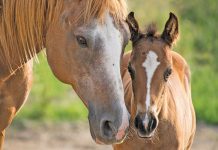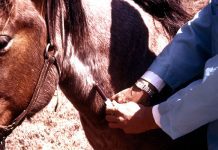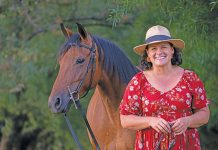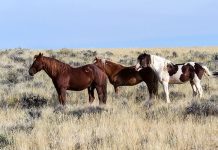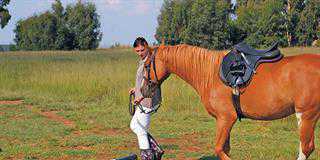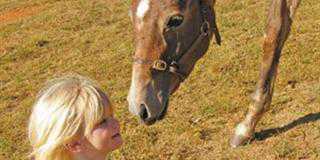Donkeys are very resilient and don’t show very obvious symptoms when sick. One of the first signs of ill health is lack of appetite, but overall appearance can also give clues about a donkey’s health.
Appetite and water
A donkey with teeth problems can lose weight rapidly because it can’t chew veld grass, and few donkeys are fed concentrated rations. If food falls out of its mouth (known as quidding) it could have tooth problems. There’s definitely something wrong with a donkey’s appetite if it stands for long periods without grazing, particularly if the other donkeys are grazing. Loss of appetite is a symptom of infectious diseases like biliary fever and strangles. It’s also important to see if it’s drinking. A donkey that’s not drinking water can die within four days. Causes include rabies (also called hydrophobia or “fear of water”) and choke (where a ball of grass or a foreign object is stuck in the oesophagus).
Judging by appearance
Evaluating a donkey’s overall appearance is also important. The membranes of the eyes and gums should be pink, the eyes should be clear, without any discharges, and its coat should be smooth and even, even in the winter when all donkeys are shaggy. You shouldn’t groom donkeys daily, as the thick matted hair protects the skin from harness chafes, thorns, ticks and flies.
But this mat of hair can also conceal wounds. If you suspect an injury, carefully examine the area to make sure the skin isn’t broken. Wounds heal very rapidly, but you should clean them with salt water (three teaspoons per cup of boiled, then cooled water) and inject an antibiotic if the wound is very deep. Check the ears regularly for brown ear ticks – tick grease or Karbadust can be used from August to April to keep these parasites under control and prevent ear abscesses from developing.
Other sites for ticks in donkeys are behind the heels, under the tail and in the inguinal area.You should also check the faeces and urine. Donkey dung is smaller and harder than that of a horse, and is usually a dark-brown or blackish colour.
If it’s very green or loose, like that of a cow, the grazing may be too rich and the donkey could develop laminitis. Unlike horses, donkeys can digest straw and hard grasses. The urine should be pale yellow, not dark or bloody. Donkey feet are much smaller and more upright than those of horses. Their hooves are very hard, but if a donkey is regularly used on tarred roads, they need to be shod. It’s very seldom that a donkey will develop footrot, but a diet deficient of – or too high in – minerals like calcium, phosphate or fluoride can cause the hooves to twist upwards in a crescent shape.
Working donkeys should be observed to see if they’re moving properly and are not lame. Lameness in donkeys is similar to that in horses, but certain breeds of donkeys are “gaited”. That is, they pace and this can be mistaken for an uneven gait. The most severe cause of lameness in donkeys that eat too much green grass is laminitis. The hooves are hot and the donkey stands like a “saw horse” as it tries to balance itself on its heels to alleviate the pain of its inflamed hooves. If untreated, this can be fatal.
Diseases to vaccinate against
Although horsesickness vaccines aren’t usually given, donkeys are susceptible to tetanus and equine influenza and should be vaccinated annually. A rabies vaccine can be given in the case of a local outbreak as rabid donkeys have been found in South Africa.
Although they’re fairly resistant, donkeys can contract biliary fever from ticks and become pale and listless with an increased heart-rate. This should be treated by a vet. Deworming about three times a year is advised. Donkeys respond well to oral horse-dewormers that contain ivermectin, but the dose must be adjusted to their weight – most adult donkeys in South Africa only weigh between 150kg and 200kg.


